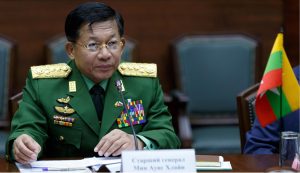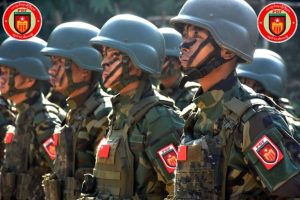
အာဏာရှင် စစ်တပ်၏ ကြီးစိုးမှုနှင့် အုပ်ချုပ်မှုကို အမြစ်ပြတ် ချေမှုန်းရန် တစ်ခုတည်းသော နည်းလမ်းမှာ စစ်ရေးအရ အနိုင်ယူရန်သာဖြစ်ဟု KNU ဥက္ကဋ္ဌ ပဒိုစောကွယ်ထူးဝင်းပြော
အကြမ်းဖက် အာဏာရှင် စစ်တပ်၏ ကြီးစိုးမှုနှင့် အုပ်ချုပ်မှုကို အမြစ်ပြတ် ချေမှုန်းရန် တစ်ခုတည်းသော နည်းလမ်းမှာ စစ်ရေးအရ ဖိအားပေး၍ အနိုင်ယူရန် ဖြစ်ကြောင်း ကရင်အမျိုးသားအစည်းအရုံး- KNU ဥက္ကဋ္ဌ ပဒိုစောကွယ်ထူးဝင်းက ပြောဆိုလိုက်သည်။
ယနေ့ ကျရောက်သည့် ၂၇၆၄ ခုနှစ် ကရင်အမျိုးသားနှစ်သစ်ကူးနေ့ မိန့်ခွန်းတွင် ၎င်းက အထက်ပါအတိုင်းပြောဆိုလိုက်ခြင်းဖြစ်သည်။
နိုင်ငံတော်အာဏာကို မဟုတ်မမှန်အကြောင်းအရာများကို ဖော်ပြပြီး အဓမ္မသိမ်းယူခဲ့သည့် မြန်မာစစ်တပ်၏ လုပ်ရပ်ကို ပြည်သူလူထုက လက်မခံခဲ့ကြဘဲ အစိုးရ ဝန်ထမ်းများ၊ ပညာရေးနှင့် ကျန်းမာရေးဝန်ထမ်းများ အထူးသဖြင့် လူငယ်လူရွယ်များ က ကန့်ကွက် ဆန္ဒပြခဲ့ကြကြောင်း၊ စစ်တပ်ကအကြမ်း ဖက် နှိမ်နင်းခဲ့သောကြောင့် ထိခိုက်ဒဏ်ရာရရှိမှုများစွာ အပြင် အသက်သေဆုံးမှုများ အများအပြားရှိခဲ့ကြောင်း၊ စစ်တပ်၏ အကြမ်းဖက် နှိမ်နင်းခြင်းများ ပိုမိုဆိုးရွား လာသောကြောင့် အာဏာသိမ်းမှုကို နည်းလမ်းမျိုးစုံမှ ကန့်ကွက်ဆန့် ကျင် ဆန္ဒပြမှုများသည်လည်း ရရာလက်နက်များဖြင့် ပြန်လည် ခုခံကာကွယ်လာရသည်မှတစ်ဆင့် လက်နက်ကိုင်တိုက်ပွဲဝင် ဆန့်ကျင်တော်လှန် လာရသည်အထိ ဖြစ်လာခဲ့ကြောင်း ၎င်းက ဆိုသည်။
“ဗမာစစ်တပ်၏ ကြီးစိုးမှုနှင့် အာဏာသိမ်းအုပ်ချုပ်မှုများကို တိုက်ဖျက်ပြီး အမြစ် ပြတ်ချေမှုန်းသွားရန် တစ်ခုတည်းသော နည်းလမ်းမှာ ၎င်းတို့ အား ကိုး အားထားအသုံးပြုနေရသည့် စစ်ရေးအရ ဖိအားပေး၍ အနိုင်ယူခြင်းပင်ဖြစ် သည်။ အနာဂတ်တိုင်းပြည်၏ လူမျိုးစု၊ တိုင်းရင်းသားများအကြား သဟ ဇာတဖြစ်ရေး၊ ငြိမ်းချမ်းရေး၊ ဖွံ့ဖြိုးတိုးတက်ရေး တို့ရှိလာစေရန် ဖက်ဒရယ် ဒီမိုကရေစီ ပြည်ထောင်စုကိုသာလျှင် တည်ဆောက်ရမည်ကို လူမျိုးစု၊ တိုင်းရင်း သား မိဘပြည်သူများ၊ အထူးသဖြင့် လူငယ်လူရွယ်များမှ သိမြင်ပြီး လက်ခံလာ မှုများ ပိုမိုများပြားလာသည်။ လူမျိုးစုများ၊ မိဘပြည်သူ လူထု၊ လူငယ်လူရွယ်များမှ ရရာ လက်နက်စွဲကိုင်လျက် အာဏာသိမ်း ဗမာစစ်တပ်နှင့်အပေါင်း အပါများ ကို စစ်ရေးအရ ဆန့်ကျင်တိုက်ပွဲဝင်ခြင်းများ ပြင်းထန်လာရပေသည်” ဟု KNU ဥက္ကဋ္ဌ ပဒိုစောကွယ်ထူးဝင်းက ဆက်လက်ပြောဆိုသည်။
လက်ရှိတွင် စစ်တပ်သည် အဘက်ဘက်မှ ကျပ်တည်းမှု၊ ခက်ခဲမှုများ ရပ်ဆငိင်နေရပြီဖြစ်ကြောင်း၊ ပြည်သူလူထုကလည်း စစ်တပ်အင်အားစုကို ယုံကြည်မှု၊ ထောက်ခံမှု မရှိတော့ကြောင်း၊ စစ်တပ်၏ ရက်စက်ယုတ်မာမှုများကြောင့် ပြည် သူလူထုအများစုမှာ ဆင်းရဲကျပ်တည်းခြင်း၊ ပျက်စီးဆုံးရှုံးခြင်း၊ ထိခိုက်သေဆုံးခြင်း၊ ပူပန်စိုးရွံ့ခြင်းများကို ကြီးမားစွာ ရင်ဆိုင်နေရကြောင်း ၎င်း ကဆိုသည်။
“မဟာလူမျိုးကြီး ဝါဒနှင့် အာဏာရှင်စနစ်၏ အသွင်သဏ္ဍန်အမျိုးမျိုးကို အပြီး တိုင် လုံး၀ ချုပ်ငြိမ်း ပျက်သုဉ်းသွားသည်အထိ တိုက်ဖျက်သွားရန် မျှော်မှန်းထားပါသည်။ မျှော်မှန်းချက် ပြည့်စုံစေရန် လုပ်ဆောင်ရမည့် အခြားနည်းလမ်း မရှိတော့ပါ ။ ကရင်လူမျိုးများ၊ လူမျိုးစုများ တိုင်းရင်းသား မိဘပြည်သူများအနေဖြင့် အခြေအနေအရပ်ရပ်ကို အတူတကွ နားလည် သိရှိ လက်ခံပြီး ရင် ဆိုင်သွားကြရန်၊ အတူလက်တွဲ၍ အောင်မြင်မှု ရရှိရန် တော်လှန်ရေး လှုပ်ရှားမှုများတွင် အတူရပ်တည် တိုက်ပွဲဝင်သွားကြရန် တိုက်တွန်းအားပေးရင်း အသိ ပေး ကြေညာကာ ဖိတ်ခေါ် ကမ်းလှမ်းလိုပါသည်” ဟု ၎င်းက ပြောဆိုသည်။
ထို့ပြင် KNU အနေဖြင့် ကော်သူးလေး အုပ်ချုပ်ရေးနှင့် ပြည်သူ့ရေးရာ စီမံခန့်ခွဲရေး လက်စွဲကို အတည်ပြု သတ်မှတ်ကိုင်စွဲပြီး ကော်သူးလေအစိုးရ တစ်ရပ်အနေဖြင့် တည်ဆောက် ရပ်တည်လုပ်ဆောင်သွားမည်ဖြစ်ကြောင်း ၎င်းက အတိအလင်း ကြေညာလိုက်သည်။
Canada is the second-largest country in the world by total area, known for its vast natural landscapes, multicultural society, and high quality of life. Located in North America, it shares its southern border with the United States and has coastlines on both the Atlantic and Pacific Oceans.
Key Facts About Canada:
- Capital: Ottawa
- Ottawa is the capital of Canada, located in the province of Ontario. It is the fourth-largest city in Canada and serves as the political and administrative center of the country. Major landmarks include the Parliament Hill and the Rideau Canal.
- Largest City: Toronto
- Toronto is Canada’s largest city and an economic hub. It is located in Ontario and is known for its diverse population, modern skyline, and cultural institutions, such as the Royal Ontario Museum and the CN Tower.
- Language:
- Canada is a bilingual country with two official languages: English and French. English is the most widely spoken, while French is predominantly spoken in the province of Quebec. The country recognizes the cultural and linguistic diversity of its people, and the government promotes official bilingualism.
- Geography:
- Canada is known for its breathtaking natural beauty. Its landscape includes vast forests, mountain ranges (like the Rockies), lakes (including the largest freshwater lakes in the world), rivers, and the Arctic tundra.
- The country has a variety of climates, from the harsh cold of the north to milder conditions along the southern border.
- Government:
- Canada is a constitutional monarchy with a parliamentary democracy. The head of state is the monarch (currently King Charles III), who is represented in Canada by the Governor General. The head of government is the Prime Minister, who is the leader of the party with the most seats in the House of Commons.
- Canada has a federal system of government, where powers are divided between the federal government and ten provinces and three territories.
- Economy:
- Canada has one of the highest GDPs per capita in the world, with a diverse economy based on natural resources, manufacturing, and services. The country is rich in resources like oil, natural gas, timber, and minerals, making it a significant exporter.
- Major industries include energy, automotive, technology, aerospace, and finance. Canada has strong trade relationships, particularly with the United States, and is a member of international organizations like the World Trade Organization (WTO) and the North American Free Trade Agreement (NAFTA), now replaced by the Canada-United States-Mexico Agreement (CUSMA).
- The Canadian dollar (CAD) is the official currency.
- History:
- Indigenous peoples have lived in what is now Canada for thousands of years, with a rich and diverse history of cultures and traditions. Early European exploration began with the arrival of the French and British in the 16th and 17th centuries.
- Canada became a British colony, and in 1867, the British North America Act united the provinces of Ontario, Quebec, New Brunswick, and Nova Scotia to form the Dominion of Canada.
- Over the years, Canada expanded westward, gained independence from Britain, and became a fully sovereign nation. The Constitution Act of 1982 marked the official patriation of Canada’s constitution.
- Culture:
- Canada is one of the most multicultural countries in the world, with people from a wide variety of ethnic and cultural backgrounds. Immigration plays a central role in Canadian society.
- Canadian culture reflects influences from its Indigenous, French, British, and immigrant populations. Popular cultural symbols include the maple leaf, the beaver, and hockey.
- Canada is known for its contributions to arts and culture, including music, literature, cinema, and visual arts. Famous Canadian figures include authors Margaret Atwood and Leonard Cohen, musicians Drake and Celine Dion, and actors Ryan Reynolds and Rachel McAdams.
- Healthcare:
- Canada has a publicly funded healthcare system, known as Medicare, which provides universal health coverage to all Canadian citizens and permanent residents. Healthcare services are delivered by the provinces and territories, with funding primarily from federal taxes.
- Environmental Issues:
- Canada is known for its environmental stewardship and is home to vast wilderness areas, including national parks and UNESCO World Heritage sites. The country has strong policies aimed at protecting the environment, but it also faces challenges, including climate change, habitat loss, and pollution, particularly related to the oil sands industry.
- International Relations:
- Canada is active in international affairs and a member of many global organizations, including the United Nations (UN), the North Atlantic Treaty Organization (NATO), and the Commonwealth of Nations.
- Canada’s foreign policy is known for being peace-oriented and diplomatic, and the country has been involved in numerous peacekeeping missions. It maintains strong relations with its neighbor, the United States, and other global powers.
- Tourism:
- Canada is a popular tourist destination, known for its stunning natural landscapes, outdoor activities, and vibrant cities. Visitors flock to the Canadian Rockies, Niagara Falls, and cities like Vancouver, Montreal, and Quebec City.
Fun Facts:
- Canada is home to the longest coastline of any country in the world, stretching over 202,080 kilometers (125,187 miles).
- It has over 40 national parks and national park reserves, which cover approximately 3.8% of its landmass.
- Canada’s national sport is ice hockey, and the country has won the most Olympic gold medals in ice hockey.
Canada is known for its peaceful, progressive, and inclusive society. Its high standard of living, natural beauty, and rich multicultural fabric make it one of the most desirable places to live and visit.





